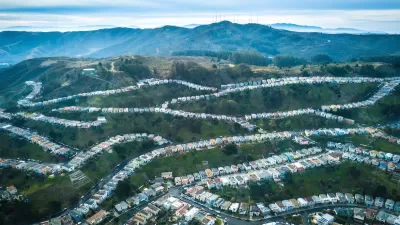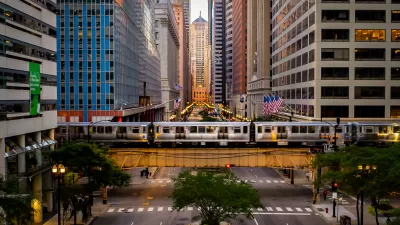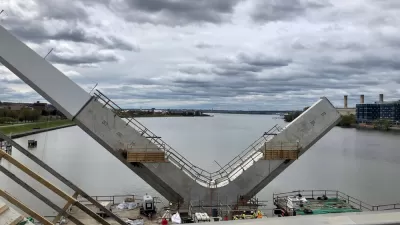This past week I had the pleasure and honor of participating in the Next American City's Urban Vanguard conference. Held in Washington DC, the event brought 35 young urban leaders together from a wide variety of backgrounds. The magazine--one of my favorites--did an outstanding job organizing and running the two-day blitz of tours, events, networking opportunities, and intimate conference sessions. In an effort to keep this brief, I have outlined three highlights from the second day of the conference.
This past week I had the pleasure and honor of participating in the Next American City's Urban Vanguard conference. Held in Washington DC, the event brought 35 young urban leaders together from a wide variety of backgrounds. The magazine--one of my favorites--did an outstanding job organizing and running the two-day blitz of tours, events, networking opportunities, and intimate conference sessions. In an effort to keep this brief, I have outlined three highlights from the second day of the conference.
Afer formally presenting our own work to fellow Vanguards, Harriet Tregoning's keynote address provided all attendees with an
opportunity to hear the latest from a smart growth luminary. From abolishing
parking minimums to expanding the city's bicycle and transit network,Tregoning energetically shared the work she is undertaking as Washington DC's Director of Planning. Attendees seemed just as impressed with her engaging presentation style as they were with the progressive moves she is making to create a better and more sustainable city--one that may serve as a model for our whole country. What is more, Tregoning arrived at the event by bicycle, which may be the
fastest way to impress this blogger. After all, not every urbanist walks the walk...
After the presentation, Tregoning fielded tough topical questions on diverse issues like removing the city's federally imposed height limit and the supposed dearth of excellent modern architecture in the city's largely historic core. Her response to the former cited the impressive amount of development the city can still absorb without building an inch higher. In answering the latter, she admitted that some better design could occur, but reasoned that DC is not exactly a 'starchitect' type of town. Both debates, as you can imagine, could not be settled in a mere afternoon.
Following the keynote, Vanguard attendees broke into three groups to exchange ideas loosely related to our areas of expertise: Public involvement, transportation, and
land use. Great discussion was generated amongst the architects, planners,
politicians, writers, policy wonks, and advocates in the room. Indeed, it's rare to have the chance to speak to so many bright people across disciplines at once, and its instructive to learn how a generally likeminded group of urbanists can see a single issue through so many different lenses.
Later that evening, the Next American City's
monthly Urban Nexus event brought DC's most well-known bloggers
together to discuss the role of blogging and its ability or inability to
spur debate, increase public involvement, and create physical and policy change. The impressive roundtable
included, amongst others, David Alpert from Greater, Greater Washington, Matthew
Yglesias of Think Progress, and Ben Adler who is a Next American City Fellow and contributor to Politico.Many individual experiences and opinions were bandied about, including thoughts on the limitations of online media and social networking. However, in the end it seemed most panelists shared personal anectodes explaining how harnessing web 2.0 technology is helping them create change, or in the least, build awareness and opportunities for civic engagement. This was noted to be especially important in the face of the shrinking print media industry that often fails to cover local "hot button" issues with any sort of regularity or journalistic acumen.
While it
is not quite clear how the Vanguard will be involved with the Next American City in
the coming year--dozens of ideas were discussed and a draft manifesto was created--it is clear that we will all work with the good folks at the magazine to help them advance the discussions surrounding the 21st century American city. And as exciting as that is, I am already looking beyond the next year with anticipation, as collaborating and following my fellow Vanguards long into the future promises to be as inspiring as it was to learn about the accomplishments that brought them to Washington DC in the first place.

Depopulation Patterns Get Weird
A recent ranking of “declining” cities heavily features some of the most expensive cities in the country — including New York City and a half-dozen in the San Francisco Bay Area.

California Exodus: Population Drops Below 39 Million
Never mind the 40 million that demographers predicted the Golden State would reach by 2018. The state's population dipped below 39 million to 38.965 million last July, according to Census data released in March, the lowest since 2015.

Chicago to Turn High-Rise Offices into Housing
Four commercial buildings in the Chicago Loop have been approved for redevelopment into housing in a bid to revitalize the city’s downtown post-pandemic.

EV Infrastructure Booming in Suburbs, Cities Lag Behind
A lack of access to charging infrastructure is holding back EV adoption in many US cities.

Seattle Road Safety Advocates Say Transportation Levy Perpetuates Car-Centric Status Quo
Critics of a proposed $1.3 billion transportation levy say the package isn’t enough to keep up with inflation and rising costs and fails to support a shift away from car-oriented infrastructure.

Appeals Court: California Emissions Standards Upheld
The U.S. Environmental Protection Agency and the California Air Resources Board, the nation's two most powerful environmental regulatory agencies, won an important round in federal court last week. But the emissions standards battle may not be over.
Barrett Planning Group LLC
City of Cleburne
KTUA Planning and Landscape Architecture
HUD's Office of Policy Development and Research
Mpact Transit + Community
HUD's Office of Policy Development and Research
City of Universal City TX
ULI Northwest Arkansas
City of Laramie, Wyoming
Write for Planetizen
Urban Design for Planners 1: Software Tools
This six-course series explores essential urban design concepts using open source software and equips planners with the tools they need to participate fully in the urban design process.
Planning for Universal Design
Learn the tools for implementing Universal Design in planning regulations.























